Scratch The Lamp Original Design / Scratch Built
Scratch - The Lamp {Scratch}
Contributed by Dennis McClain-Furmanski
| Manufacturer: | Scratch |
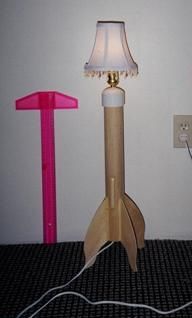
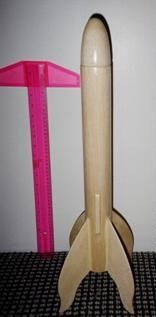
Brief:
It's a lamp. It's a rocket. It's both--and with wood paneling
Construction:
The parts list:
- 1 BT-70 tube, 18" long
- 1 "Bertha" style balsa nose cone
- 4 fins cut from 1/8" balsa sheet
- Launch lug constructed from 1/4" wide slats of 1/8" balsa
- 18" strips of 1/16" balsa sheet of various widths used as paneling
- 24mm motor mount for BT-70 body (2 centering rings, 4" of 24mm tube, "E" size engine hook)
- Recovery equipment for LPR (shock cord, Estes style folded paper anchor, screw eye in nose cone base, 18" chute with snap swivel)
- Additional snap swivel on shock cord
- Electrical components kit for lamp fitting
- Wiring nuts
- Lamp shade (cheesy with dangly plastic jewels)
- 2" PVC pipe cap
- Sanding sealer and polyurethane spray for finishing
- 320, 400, and 600 grit wet/dry sandpaper
Having seen the nice finish I could get with Deft spray lacquer sanding sealer, I decided to take on a wood working project. My wood working project turned out to fly.
As a BT-70 based rocket, initial construction was straightforward and wood glue was used throughout. The motor tube was fitted with the 3.75" 'E' engine hook and the centering rings glued on. This was glued into the aft end of the body tube. An Estes type folded paper shock cord mount was constructed and glued in. A snap swivel was added to the end of the 1/4" elastic shock cord as well. The screw eye was screwed into the nose and glue added to strengthen it.
Fins were cut from 1/8" balsa sheet and sanded to uniform shape, but were not rounded. Edges were instead sanded square. Body tube was marked and fins glued on as normal but no fillets were added at this point.
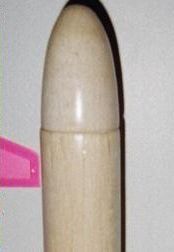 4 strips of
1/16" balsa were cut just over 18" long. Widths were allowed to vary
slightly, to give the impression of paneling. These were measured against the
root of the fins, and a 1/8" notch cut out from the top of the fin to the
bottom of the strip. These strips were glued in place on the tube, with the
notch over the fins. Many rubber bands were used to keep the balsa curved
against the tube while drying. The rubber bands were removed once the glue was
dry.
4 strips of
1/16" balsa were cut just over 18" long. Widths were allowed to vary
slightly, to give the impression of paneling. These were measured against the
root of the fins, and a 1/8" notch cut out from the top of the fin to the
bottom of the strip. These strips were glued in place on the tube, with the
notch over the fins. Many rubber bands were used to keep the balsa curved
against the tube while drying. The rubber bands were removed once the glue was
dry.
The process was repeated until the entire tube was covered. Then with the slats dry, fin fillets were added. Two wood glue fillets were put on followed by a fillet of wood putty to cover them. Everything was sanded smooth with 320 grit paper.
A square launch lug was constructed by making a trough out of three 4" long pieces of 1/8" balsa to fit a 1/8" rod. After gluing, the ends were rounded and the lug was glued to one of the slats between two fins, centered on the CG. The nose cone was put in place, finishing the rocket construction.
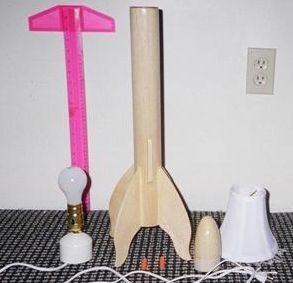 For the lamp
mode conversion, a lamp fixture kit intended for making a lamp out of a bottle
was used. It had a 1/4" stem with nut with the 6' of wire ending with the
plug. The wire was cut 1 foot below the fixture and the ends of both pieces
stripped back 1 inch. The 2" PVC cap had a 1/4" hole drilled in the
center and reamed out slightly larger with a rat tail file until the lamp
fixture stem fit through the hole. The fixture was set on the PVC cap through
the hole so that the nut slides over the wire, allowing it to be tightened to
the bottom side of the cap.
For the lamp
mode conversion, a lamp fixture kit intended for making a lamp out of a bottle
was used. It had a 1/4" stem with nut with the 6' of wire ending with the
plug. The wire was cut 1 foot below the fixture and the ends of both pieces
stripped back 1 inch. The 2" PVC cap had a 1/4" hole drilled in the
center and reamed out slightly larger with a rat tail file until the lamp
fixture stem fit through the hole. The fixture was set on the PVC cap through
the hole so that the nut slides over the wire, allowing it to be tightened to
the bottom side of the cap.
The cut end of the plug portion of the cord was run up through the motor tube and pulled out the top of the body tube. The wires were connected with wire nuts. The cap was then lowered down onto the body tube and the slack cord pulled out the bottom.
Since the fixture had to have a lamp shade stand, a lamp shade that clips over the 40W light bulb was used.
To convert to rocket mode, lamp sections are removed in reverse order to above (but not disassembled!), then the nose cone and chute are attached to shock cord with snap swivels, wadding is added, and then it's ready for an engine.
Finishing:
Two coats of Deft spray lacquer sanding sealer on everything, sanding after
each (400 grit then 600 grit). Then polyurethane spray was put on in several
coats until there was no gap between the body slats detectable to the touch,
although they were still visible.
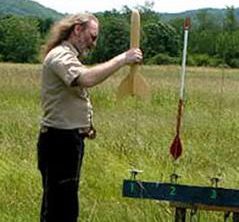
Flight:
First flight was delayed due to humidity. Moisture had caused the launch lug to
swell and it wouldn't fit over the 1/8" rod. I brought it home from the
launch site and jammed a 1/8" rod up and down through the lug, reaming it
out until the rod slid freely.
Second try was the following month at the next CATO launch with a C11-3 (and 1 inch spacer in motor tube. The lamp flies! Flight was slow and stately with a slight arc into the wind, good ejection and deployment, landing and recovery completed intact.
Second flight was on a E9-4. The Lamp can really rip. Good straight boost, arched over during coast, with ejection 1 second past apogee. Good deployment and descent. Recovery completed without incident.
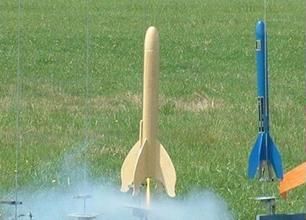 Third flight
will have to wait. With the point proven that it would fly, my wife wanted her
lamp back intact. She likes her lamp that has been a rocket, but right now it
is her lamp that she can show to people and tell them it flew. Having been a
master sergeant in the Army, she also enjoys having a piece of furniture that
smells of burnt black powder, reminding her of the old days.
Third flight
will have to wait. With the point proven that it would fly, my wife wanted her
lamp back intact. She likes her lamp that has been a rocket, but right now it
is her lamp that she can show to people and tell them it flew. Having been a
master sergeant in the Army, she also enjoys having a piece of furniture that
smells of burnt black powder, reminding her of the old days.
Summary:
No CONs that weren't my fault, or unforeseeable due to humidity.
The PRO was simply to build it, make it give off light, fly it, and make it give off light again successfully. And, of course, to give my wife her one little connection to my hobby without her having to be involved--she prefers gardening and thinks that things that fly should be swatted!
 |
 |